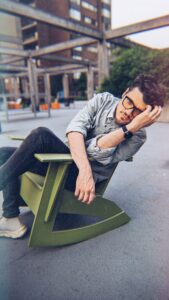Reserve FREE tickets to Coming Home here!
Introduction to City of Asylum | Anouar Rahmani | Oleksandr Frazé-Frazénko
Learn more about City of Asylum: https://cityofasylum.org/
Introduction to City of Asylum
Located on Pittsburgh’s North Side, City of Asylum champions freedom of creative expression by providing sanctuary to writers and artists who have been endangered or exiled for using their voices to speak out against the world’s injustices. In addition to their Exiled Writer and Artist Residency Program and Fellowship for Ukrainian Writers — which enable artists and writers to continue to create in safe, supportive environments — City of Asylum offers numerous free literary, arts, and humanities programs designed to build social equity through cultural exchange. Their work enriches local and global communities alike by ensuring that the voices calling for a safe, just, and equitable world are not silenced.
Anouar Rahmani
 Meet Anouar Rahmani, a writer and human rights defender from Algeria and current writer-in-residence with City of Asylum Pittsburgh. Anouar advocates for individual freedoms, environmental rights, and the rights of minorities, women, and the LGBT+ community, and he has faced instances of judicial harassment in Algeria due to his activism. Anouar said his sense of home is related to the process of leaving a place, and this idea begins with everyone’s first, most primitive home.
Meet Anouar Rahmani, a writer and human rights defender from Algeria and current writer-in-residence with City of Asylum Pittsburgh. Anouar advocates for individual freedoms, environmental rights, and the rights of minorities, women, and the LGBT+ community, and he has faced instances of judicial harassment in Algeria due to his activism. Anouar said his sense of home is related to the process of leaving a place, and this idea begins with everyone’s first, most primitive home.
“Of all definitions, I think the mother’s womb holds the most important meaning of home. Humans are constructions of discussions that happen within our chromosomes, our genetics. Everything we become — politically, socially, emotionally — starts there. Leaving the mother’s womb is also the first rupture indicating that home is what we leave, and not where we live,” Anouar said. “When I arrived in Pittsburgh, I was not journeying to a new home, but leaving behind the legal consequences of activism in my home’s political system. It was a loss of home, like something was missing. But then, something happened: I traveled to Philly, and when I left Philly to return to Pittsburgh, I felt like I was coming back home. I had to leave Pittsburgh for it to hold a feeling of home.”
While many people may think the ideal home is a place where we feel fully accepted, Anouar said he sees things differently. “I’ve found that total acceptance is an illusion; there is no home in which all people see things exactly the same way,” he said. “Coexistence, on the other hand, is built on the idea that we do not need to fully accept or agree in order to share a home peacefully. I think we should search not for total acceptance, but for coexistence.”
Learn more about Anouar Rahmani: www.cityofasylum.org/artist/anouar-rahmani
Oleksandr Frazé-Frazénko
 “To me, home is the inner self. It’s not a physical place. It’s a feeling. While studying the history of poetry, I learned that almost all the huge names in poetry did not stay in the same place. From Ovid to Ezra Pound, many of them left everything behind. But viewing home as a feeling rather than a place… this allows us to bring home with us wherever we go.”
“To me, home is the inner self. It’s not a physical place. It’s a feeling. While studying the history of poetry, I learned that almost all the huge names in poetry did not stay in the same place. From Ovid to Ezra Pound, many of them left everything behind. But viewing home as a feeling rather than a place… this allows us to bring home with us wherever we go.”
These are the words of Oleksandr Frazé-Frazénko, writer-in-residence at City of Asylum Pittsburgh. During the first year of the war in Ukraine, Oleksandr worked with foreign journalists to spread the truth about the situation and the historical context. His feelings about the meaning of home are woven all throughout his creative work.
“A main idea in Ukrainian literature is that you should not betray your language or culture,” Oleksandr shared. “I first came to the US in 2015, and when I went back to Ukraine after just two months, some people did make me feel like I was betraying my culture.” This experience, he said, mirrors that of Ukrainian writers who left their country during the two world wars. “These writers explored new perspectives and created important literature abroad, but Ukrainians who had been influenced by the Soviet Union decided they were now enemies because of this.”
Oleksandr said he understands that those writers wanted to preserve the country they loved within themselves and their work so it would never be fully lost under the Soviet Union. He too hopes to preserve the Ukraine he loves through his work. “I am finishing a book of ‘documentary poetry,’ the first book I’ve written in English,” he said. “It’s a way to bring both my old perspective and new perspective together, and to show the real Ukraine to those who read it.”
Learn more about Oleksandr Frazé-Frazénko: www.cityofasylum.org/artist/oleksandr-fraze-frazenko